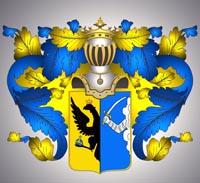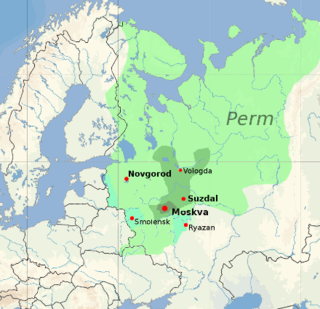Muscovite is a mineral.
Muscovite may also refer to:
- A demonym for an inhabitant of the city of Moscow
- An old foreign name for Russians who inhabited the Principality of Moscow or the Tsardom of Russia
Muscovite is a mineral.
Muscovite may also refer to:

Ignatyev, Ignatiev, or Ignatieff or Ignatyeva is a Russian surname derived from the name Ignatius, in Russian, Ignatiy/Ignaty. In the Imperial Russia the Ignatievs noble family was established sometimes in the 17th century as a cadet branch of the Pleshchevs family from Chernihiv (Czernihów). Along with Pleshchevs, the Ignatievs family takes its roots from a Muscovite boyar Theodore Biakont who emigrated from Chernihiv to Moscow sometime in the 14th century, see Alexius, Metropolitan of Kiev.
Velyaminov, or Velyaminova, is a Russian last name and may refer to:
Polish invasion of Russia or Polish invasion of Rus may refer to
Polish–Muscovite War can refer to:
Moscow Uprising may refer to several events that took place in Moscow, Russia:
Komsomolsky (masculine), Komsomolskoye (neuter), or Komsomolskaya (feminine) may refer to:
Kuzma may refer to:
Yuryev, sometimes spelled as Yuriev, or Yuryeva/Yurieva, is a Russian last name that is derived from the male given name Yury and literally means Yury's. It may refer to:
Russia, or the Russian Federation, is the largest country in the world by area, located in northern Eurasia.
Alexeyevsky (masculine), Alexeyevskaya (feminine), or Alexeyevskoye (neuter) may refer to:
Grand Principality of Rus' or Grand Duchy of Rus' may refer to:
Muscovy or Moscovia is an alternative name for the Principality of Moscow (1263–1547) and the Tsardom of Russia (1547–1721).
Invasion of Russia can refer to:

The Principality of Moscow or Grand Duchy of Moscow, also known simply as Muscovy, was a principality of the Late Middle Ages centered on Moscow. It eventually evolved into the Tsardom of Russia in the early modern period. The princes of Moscow were descendants of the first prince Daniel, referred to in modern historiography as the Daniilovichi, a branch of the Rurikids.
Originally, the name Rus' referred to the people, regions, and medieval principalities within the territory of the Kievan Rus'. Today its territory is distributed among Belarus, Ukraine, Eastern Poland, and the European section of Russia. The term Россия (Rossiya), comes from the Byzantine Greek designation of the Rus', Ρωσσία Rossía—related to both Modern Greek: Ρως, romanized: Ros, lit. 'Rus'', and Ρωσία.
Rus or RUS may refer to:
Moskal is an ethnic slur that means "Russian", literally "Muscovite", in Ukrainian, Romanian, Polish and Belarusian.
The siege of Polotsk might refer to several sieges of the city:
The Battle of Moscow was a 1941–1942 battle during World War II.

Moscow, third Rome is a theological and political concept asserting Moscow as the successor to ancient Rome, with the Russian world carrying forward the legacy of the Roman Empire. The term "third Rome" refers to a historical topic of debate in European culture: the question of the successor city to the "first Rome" and the "second Rome".